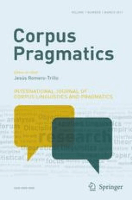
Corpus Pragmatics
Scope & Guideline
Fostering Interdisciplinary Dialogues in Language and Technology
Introduction
Aims and Scopes
- Corpus-Based Analyses:
The journal emphasizes quantitative and qualitative corpus-based studies that investigate linguistic phenomena across different languages and contexts. - Pragmatic Variation and Change:
Research often explores how pragmatic features vary across different dialects, cultures, and social contexts, allowing for a nuanced understanding of language use. - Discourse Analysis:
The journal publishes works that analyze discourse markers, politeness strategies, and other pragmatic features in spoken and written texts, contributing to the field of discourse analysis. - Interdisciplinary Approaches:
By integrating insights from linguistics, sociology, psychology, and cultural studies, Corpus Pragmatics offers innovative perspectives on language use and communication. - Educational Applications:
The journal also addresses the implications of corpus studies for language teaching and learning, providing insights into how corpus linguistics can inform pedagogical practices.
Trending and Emerging
- Digital Communication and Social Media:
Recent studies are increasingly focusing on language use in digital contexts, such as social media and online discourse, reflecting the significance of these platforms in contemporary communication. - Multimodal and Multilingual Approaches:
There is a rising interest in exploring multimodal corpora and multilingual practices, highlighting how different modes of communication and languages interact in various contexts. - Pragmatics in Educational Contexts:
Research examining the implications of corpus linguistics for language teaching, particularly in English as a Foreign Language (EFL) contexts, is gaining traction as educators seek data-driven insights. - Identity and Ideology in Discourse:
Emerging themes are also focusing on how identity and ideological constructs are communicated through language, particularly in political discourse and community interactions. - Corpus Methodology Innovations:
The development and application of innovative corpus methodologies, including machine learning and computational approaches, are becoming more prevalent, enhancing the analytical capabilities of researchers.
Declining or Waning
- Traditional Theoretical Approaches:
Research that heavily relies on traditional theoretical frameworks without incorporating corpus data has seen a decline, as the field increasingly values empirical, data-driven analyses. - General Linguistic Studies:
Papers focused on general linguistic features without a pragmatic or corpus perspective appear to be waning, as the journal's scope narrows towards more applied and context-driven research. - Overly Narrow Focus on Specific Languages:
Studies that concentrate solely on one language or dialect without comparative analysis or broader implications are becoming less common, as the journal encourages more inclusive and cross-linguistic approaches. - Descriptive Studies Lacking Pragmatic Insight:
Descriptive studies of language that do not engage with pragmatic implications or contextual factors are less frequently published, reflecting a shift towards more analytical and interpretive research.
Similar Journals
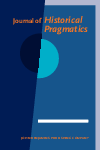
Journal of Historical Pragmatics
Decoding Language Evolution Across ErasJournal of Historical Pragmatics, published by JOHN BENJAMINS PUBLISHING CO, stands as a pivotal platform in the field of linguistics, focusing on the intersection of language, history, and pragmatics. With its ISSN 1566-5852 and E-ISSN 1569-9854, this esteemed journal has been curating scholarly discussions since 2000, with a converged publication timeline extending to 2024. Acknowledged for its academic rigor, it holds a commendable Q2 category ranking in the Linguistics and Language domain and features impressive Scopus rankings, being placed at #202 out of 1088 in Arts and Humanities and at #237 out of 1167 in Social Sciences. The journal is instrumental in advancing our understanding of historical language use and its sociocultural ramifications, offering researchers, professionals, and students a rich repository of articles that contribute to both theoretical and practical applications in historical linguistics and pragmatics. By fostering interdisciplinary dialogue and promoting innovative methodologies, Journal of Historical Pragmatics not only enriches scholarly literature but also strengthens the global academic community in uncovering the complexities of language through time.
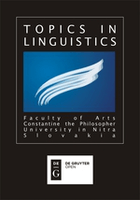
Topics in Linguistics
Navigating the Intricacies of Language and ThoughtTopics in Linguistics is a premier academic journal published by SCIENDO, specializing in the dynamic and expansive field of linguistics. With its Open Access model adopted since 2013, this journal ensures that groundbreaking research is readily accessible to scholars and enthusiasts alike, fostering collaboration and advancement in language studies. Indexed in prominent databases, it holds a Q2 ranking in the linguistics category for 2023, indicating its influence and relevance within the academic community. Hailing from Germany, the journal has established a strong international presence, ranking #291 out of 1088 in Arts and Humanities and #349 out of 1167 in Social Sciences—placing it in the top 25% of journals within these fields. Topics in Linguistics serves as a vital platform for researchers to disseminate innovative findings and engage with ongoing debates in the linguistics landscape, making it an essential resource for students, professionals, and academics committed to exploring the intricate layers of language and communication.
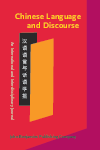
Chinese Language and Discourse
Illuminating the Intersections of Language and ArtChinese Language and Discourse, published by John Benjamins Publishing Co, is an esteemed peer-reviewed journal focusing on the fields of linguistics and language, as well as the visual arts and performing arts. With its ISSN 1877-7031 and E-ISSN 1877-8798, the journal is recognized for its rigorous scholarly contributions, achieving notable rankings within its categories—Q2 in Linguistics and Language and Q1 in Visual Arts and Performing Arts as of 2023. Based in the Netherlands, the journal serves as a vital platform for researchers and professionals seeking to explore the intricate interplay between Chinese language and discourse practices, contributing to the understanding of cultural and communicative phenomena. The journal is accessible for subscriptions, encouraging a wide readership eager to engage with contemporary debates and research insights in these dynamic fields. By bridging linguistic analysis with artistic expression, Chinese Language and Discourse fosters a multidisciplinary dialogue that is essential in today’s interconnected academic landscape, making it an indispensable resource for students and scholars alike.

Voprosy Yazykoznaniya
Connecting Researchers Through Linguistic ExcellenceVoprosy Yazykoznaniya, published by the esteemed Russian Academy of Sciences and the State Academy of Humanities (GAUGN), stands as a leading journal in the field of linguistics and language studies. With an impressive Q2 rank in Linguistics and Language for 2023 and a strong position within Scopus rankings, this journal fosters scholarly dialogue and pushes the boundaries of linguistic research by providing a platform for innovative studies, reviews, and analyses. Although not open access, its publication ensures high academic standards and visibility within the global academic community. Researchers, professionals, and students alike can benefit from the rich insights and diverse perspectives presented in this journal, serving as a vital resource for anyone interested in the intricacies of language and its role in society. Operating since 2009 and continuing to 2024, Voprosy Yazykoznaniya is an essential reference point for contemporary linguistic scholarship in the Russian Federation and beyond.

Glottometrics
Exploring the Quantitative Frontier of LinguisticsGlottometrics is an esteemed academic journal dedicated to the intersection of linguistics and quantitative methods, published by the International Quantitative Linguistics Association (IQLA). Based in Germany, this journal serves as a vital platform for researchers and professionals in the fields of linguistics and applied mathematics, fostering the exploration of quantitative approaches to language studies. With its impact factor reflecting its commitment to high-quality research, Glottometrics has established a robust presence in the academic community, as denoted by its categorization in the Q2 quartile in Linguistics and Language and Q4 in Applied Mathematics. While the journal operates on a subscription-based model, it has made significant strides in the ranking hierarchy, securing positions in the 44th to 48th percentiles across various relevant categories in Scopus. Spanning the years 2017 to 2024, Glottometrics invites contributions that harness innovative quantitative methodologies for linguistics research, making it an essential resource for students, researchers, and professionals engaged in the dynamic analysis of language.
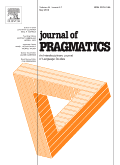
JOURNAL OF PRAGMATICS
Advancing Knowledge in Pragmatics and BeyondJournal of Pragmatics, published by Elsevier, is a premier interdisciplinary journal dedicated to the exploration of language use as a dynamic social phenomenon. Established in 1977 and set to continue through 2024, it serves as a vital resource for researchers across various fields, including Artificial Intelligence, Linguistics, and Language Studies. With an impressive Q1 ranking in Linguistics and Language and a Q2 ranking in Artificial Intelligence, the journal has made significant contributions, supporting a diverse range of theoretical and empirical research. It boasts a solid reputation, evidenced by its strong positions in Scopus rankings—occupying the 91st percentile among the best in the Social Sciences and 92nd in Arts and Humanities. Although it does not currently offer open access, the Journal of Pragmatics remains essential for professionals and scholars seeking to deepen their understanding of pragmatics and its applications in language technology, societal interaction, and cognitive processes. With its international reach and high standards, this journal is a cornerstone for anyone dedicated to advancing knowledge in the fields of language and communication.

Language and Linguistics
Connecting Cultures through Linguistic ResearchLanguage and Linguistics is a leading academic journal published by ACAD SINICA, INST LINGUISTICS, based in Taiwan. Established in 2008, this journal has rapidly gained recognition within the field of linguistics, achieving a commendable ranking of Q2 in the 2023 category quartiles and holding positions in the top percentiles of Scopus rankings for both Arts and Humanities and Social Sciences. With an ISSN of 1606-822X and an E-ISSN of 2309-5067, the journal aims to foster the development of linguistics research by providing a platform for the dissemination of innovative and interdisciplinary studies. While it currently operates on a traditional subscription model, its significant contribution to the advancement of linguistic theory and its applications makes it an invaluable resource for researchers, professionals, and students alike. Spanning converged years from 2008 to 2024, Language and Linguistics continues to shape the dialogue in understanding language phenomena and encourages submissions that push the boundaries of current linguistic knowledge.

NEUPHILOLOGISCHE MITTEILUNGEN
Unraveling Linguistic Trends from a European PerspectiveNEUPHILOLOGISCHE MITTEILUNGEN, published by the esteemed Modern Language Society, stands as a significant contribution to the domain of Language and Linguistics. With a history dating back to 1971, this journal has consistently provided an academic platform for researchers and scholars, navigating through the intricacies of philology and linguistic studies. Although it is indexed in Scopus with rankings reflecting its position in the Arts and Humanities and Social Sciences categories, it currently does not offer Open Access, which may require interested parties to seek institutional access for its wealth of content. The journal has experienced periods of coverage discontinuation in recent years, yet it remains a valued source for advancing the understanding of language theories and linguistic practices. Its location in Helsinki, Finland, offers a unique European perspective on global linguistic issues. The journal is ideal for those looking to engage with evolving linguistic trends and contribute to contemporary discussions in the field.
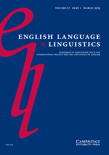
English Language & Linguistics
Exploring the Depths of Language and LinguisticsEnglish Language & Linguistics is a prestigious journal published by Cambridge University Press, specializing in the dynamic fields of linguistics and language studies. With an impressive Q1 ranking in both Linguistics and Language categories for 2023 and a notable placement in the Scopus metrics, where it ranks #142 out of 1088 in Arts and Humanities, the journal is recognized for its high-quality research contributions and robust impact in the scholarly community. Since its inception in 1997, English Language & Linguistics has provided a forum for researchers to explore various aspects of language, facilitating the dissemination of innovative ideas and empirical studies. With no open access options currently available, the journal remains a valuable resource within the United Kingdom and beyond, fostering a deeper understanding of language intricacies and their broader societal implications. For practitioners and academicians alike, this journal is a critical resource for keeping abreast of the latest advancements in linguistics.
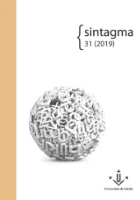
Sintagma
Exploring the Depths of Language.Sintagma is a prominent academic journal dedicated to advancing the field of Linguistics and Language, published by the Universitat de Lleida in Spain. With an ISSN of 0214-9141 and an E-ISSN of 2013-6455, this journal has established itself as an open-access platform since 1989, thereby ensuring wide accessibility and dissemination of research. The journal's commitment to quality is reflected in its ranking within the Q4 quartile of Linguistics and Language in 2021 and a similar standing in Social Sciences and Arts and Humanities, which underscores its emerging importance in these fields despite recent challenges. Covering topics that span theoretical inquiries to applied linguistic studies, Sintagma invites researchers, professionals, and students to contribute to and engage with its evolving landscape from its unique academic perspective. With the convergence of research years from 2011 to 2018 and upcoming issues through 2024, the journal remains poised to provide insightful content that addresses the linguistic dimensions of contemporary society.